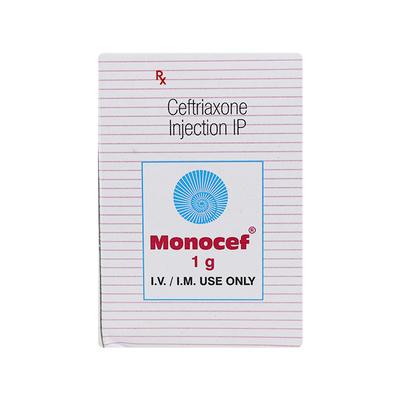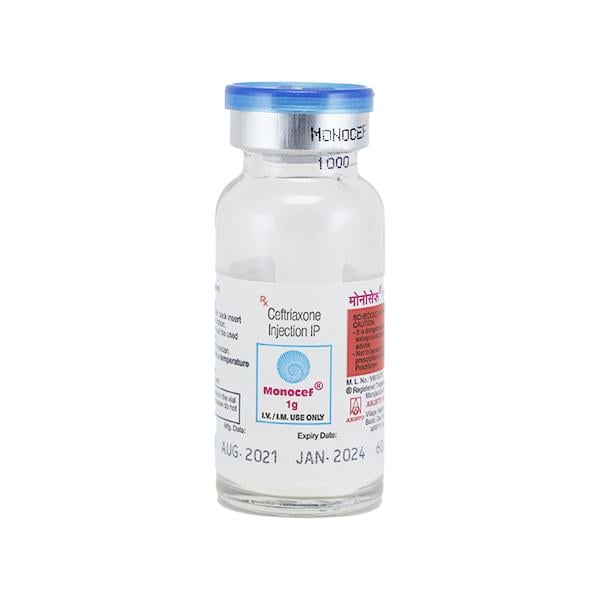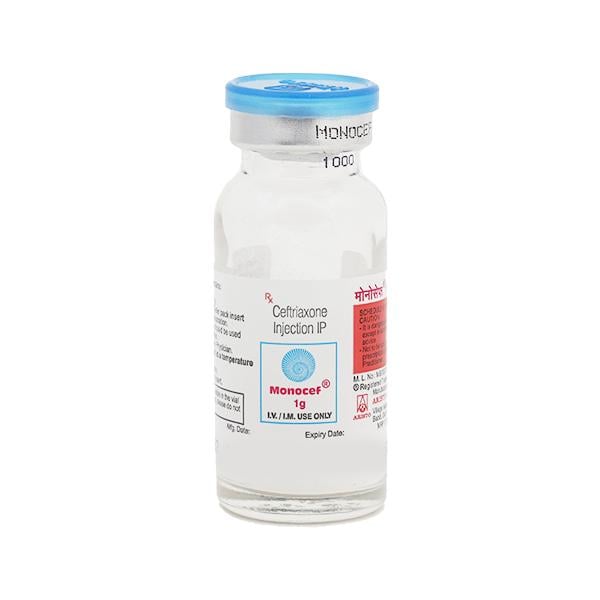

Netmeds First Membership
Quick Links
Introduction About MONOCEF 1GM INJECTION
MONOCEF 1GM INJECTION contains Ceftriaxone, which belongs to the group of medicines called Antibiotics. It is used to manage bacterial infections such as urinary tract infections, lower respiratory tract infections, bacteraemia, septicaemia, meningitis, abdominal infections, and infections caused by pseudomonas species. MONOCEF 1GM INJECTION is also used to manage infections, before and after surgery.
Tell your doctor before receiving MONOCEF 1GM INJECTION if you have or had a history of kidney or liver diseases, fungal diseases, gastrointestinal disease, or diarrhea. If you are pregnant or breastfeeding, inform your doctor before receiving MONOCEF 1GM INJECTION.
Inform your doctor if you are allergic (hypersensitive) to cephalosporins, penicillin, or any antibiotics before receiving the medicine.
Your doctor will administer the right dose depending on your child’s age, body weight, and disease condition. MONOCEF 1GM INJECTION should be used with caution in elderly patients; consult your doctor before receiving the medicine.
The most common side effects of receiving this medicine are pain, tenderness, hardness, or at the injection site and diarrhea. Consult your doctor immediately if any of the above symptoms worsen.
Uses Of MONOCEF 1GM INJECTION
Used to manage:
- Urinary tract infections
- Lower respiratory tract infections
- Bacteraemia
- Septicaemia
- Meningitis
- Abdominal infections and
- Infections caused by pseudomonas species
How MONOCEF 1GM INJECTION Works
MONOCEF 1GM INJECTION contains ceftriaxone, which is a second-generation cephalosporin that interferes with the synthesis of the bacterial cell wall by binding to specific binding proteins located inside the bacterial cell wall. This leads to breaking down the cell wall of the bacteria and reducing its stability, thus causing cell damage and eventually causing bacterial elimination.
How to use MONOCEF 1GM INJECTION
MONOCEF 1GM INJECTION will be given to you intravenously or intramuscularly only by a doctor or nurse. Your doctor will administer the right dose depending on your age, body weight, and severity of the infection.
Side Effects Of MONOCEF 1GM INJECTION
Common
- Abnormalities with white blood cells (such as a decrease of leucocytes and an increase of eosinophils) and platelets
- Diarrhea
- Thrombocytosis
- Leukopenia
- Headache
- Dizziness
- Changes in liver function
Uncommon
- Anaemia
- Nausea and vomiting
- Pruritis (itching sensation)
- Increased blood creatinine levels
- Fungal infections
- Decrease in white blood cells (granulocytopenia)
- Blood clots (pain and swelling of your joints)
- Pain or a burning feeling along the vein
- Fever
Rare
- Bronchospasm (breathing difficulty)
- Haematuria (blood in urine)
- Glycosuria (glucose in urine)
- Chills
- Inflammation of the colon. Signs include diarrhea, usually with blood and mucus
- Lumpy rash (hives), feeling itchy and swelling
- Oedema (fluid buildup)
Contact your doctor if you experience any of the following side effects:
- Sudden swelling of the face, throat, lips, or mouth. This can make it difficult to breathe or swallow
- Severe rash that develops quickly, with blisters or peeling of the skin and possibly blisters in the mouth
- Widespread rash, high body temperature, liver enzyme
- Elevations, blood abnormalities (eosinophilia)
- Enlarged lymph nodes and other body organ involvement
- Jarisch-Herxheimer reaction, which causes fever, chills, headache, muscle pain, and skin rash
How To Manage Side Effects
Diarrhea
Drink lots of fluids, such as water or fresh juice, to keep yourself hydrated. Do not take any medicine on your own for managing diarrhea. Consult your doctor if the symptom does not improve.
Headache
Apply a pain-relieving balm on their head if required. Consult your doctor if the symptom does not improve.
Warning & Precautions
Pregnancy
Monitoring requiredMONOCEF 1GM INJECTION should be used during pregnancy only if clearly needed. Consult your doctor before receiving this medicine.
Breastfeeding
Use with CautionMONOCEF 1GM INJECTION should be used with caution during breastfeeding as it may pass into the breast milk. Consult your doctor before receiving this medicine.
Driving and Using Machines
ContraindicatedDo not drive or handle any heavy machines if you experience dizziness or lightheadedness while receiving MONOCEF 1GM INJECTION.
Kidney
Use with CautionMONOCEF 1GM INJECTION should be used with caution in patients with kidney disease. Consult your doctor before receiving this medicine.
Liver
Use with CautionMONOCEF 1GM INJECTION should be used with caution in patients with liver diseases. Consult your doctor before receiving this medicine.
Allergy
ContraindicatedDo not receive MONOCEF 1GM INJECTION if you are allergic (hypersensitive) to ceftriaxone or to any other ingredients of this medicine.
Use In Pediatrics
Consult your doctorYour doctor will administer the right dose depending on your child’s age, body weight, and severity of the infection. Consult your doctor before receiving MONOCEF 1GM INJECTION.
Use In Geriatrics
Use with CautionMONOCEF 1GM INJECTION should be used with caution in elderly patients. Consult your doctor before receiving this medicine.
Others
MONOCEF 1GM INJECTION is not recommended for use if you have:
- Gastrointestinal disease (colitis)
Before receiving MONOCEF 1GM INJECTION, inform your doctor if you:
- Have hemolytic anemia (a reduction in your red blood cells that may make your skin pale yellow and cause weakness or breathlessness)
- Are on a low-sodium diet
Interactions
A. Drug-Drug interactions:
Before receiving MONOCEF 1GM INJECTION, inform your doctor if you are receiving any of the following medicine:
- Aminoglycoside (manages infections)
- Chloramphenicol (used to manage infections, particularly of the eyes)
Overdosage:
It is unlikely to receive an overdose since it will be administered by the doctor or nurse. If you experience any unusual side effects, consult your doctor immediately.
Synopsis
| Drug | : | Ceftriaxone |
| Pharmacological Category | : | Cephalosporin Antibiotics |
| Therapeutic Indication | : | Manages Bacterial infections |
| Dosage Forms | : | Injection |
More Information
Storage
- Keep out of reach of children
- Store at room temperature
FAQs About MONOCEF 1GM INJECTION
Q: What is MONOCEF 1GM INJECTION used for?
A: MONOCEF 1GM INJECTION is used to manage bacterial infections such as urinary tract infections, lower respiratory tract infections, bacteraemia, septicaemia, meningitis, abdominal infections, and infections caused by pseudomonas species. MONOCEF 1GM INJECTION is also used to manage infections before and after surgery.
Q: Can MONOCEF 1GM INJECTION be given to breastfeeding mothers?
A: MONOCEF 1GM INJECTION should be used with caution as it may pass into the breast milk. Consult your doctor before receiving. It should only be given if the expected benefits outweigh any potential risk to the baby.
Q: Can MONOCEF 1GM INJECTION cause diarrhea?
A: Yes, MONOCEF 1GM INJECTION may cause diarrhea during or after use. Usually, discontinuation of medicine can subside diarrhea. However, if diarrhea persists or if there is blood in the stool, then immediately consult your doctor.
Q: Is MONOCEF 1GM INJECTION safe during pregnancy?
A: MONOCEF 1GM INJECTION should be used during pregnancy only if clearly needed. Consult your doctor before receiving this medicine.
Q: What precautions must be followed while using MONOCEF 1GM INJECTION?
A: MONOCEF 1GM INJECTION should be used with caution in patients with kidney disease, liver diseases, hemolytic anemia (a reduction in your red blood cells that may make your skin pale yellow and cause weakness or breathlessness) or are on a low sodium diet. Consult your doctor before receiving this medicine.
Q: Who should not use MONOCEF 1GM INJECTION?
A: MONOCEF 1GM INJECTION is not recommended for use if you have gastrointestinal disease (colitis) or if you are allergic to Ceftriaxone or to any other ingredients of this medicine.
Q: Can MONOCEF 1GM INJECTION be used in children?
A: Your doctor will administer the right dose depending on your child’s age, body weight, and severity of the infection. Consult your doctor before receiving MONOCEF 1GM INJECTION.
Q: How MONOCEF 1GM INJECTION is given?
A: MONOCEF 1GM INJECTION will be given to you intravenously or intramuscularly only by a doctor or a nurse. Your doctor will administer the right dose depending on your age, body weight, and severity of the infection.
Q: How does MONOCEF 1GM INJECTION work?
A: MONOCEF 1GM INJECTION contains ceftriaxone, which is a second-generation cephalosporin that interferes with the synthesis of the bacterial cell wall by binding to specific binding proteins located inside the bacterial cell wall. This leads to breaking down the cell wall of the bacteria and reducing its stability, thus causing cell damage and eventually causing bacterial elimination.
Q: Can I use other medicines along with MONOCEF 1GM INJECTION?
A: Before receiving MONOCEF 1GM INJECTION, inform your doctor if you are receiving prescription, non-prescription, or herbal medicines.
References
1. KD. Tripathi. Nonsteroidal Antimicrobials. Essentials of medical pharmacology. Seventh edition. 2013. Page – 728.
2. D M Richards, R C Heel, R N Brogden, T M Speight, and G S Avery. Ceftriaxone. A review of its antibacterial activity, pharmacological properties, and therapeutic use. NIH: National Library of Medicine, National Center of Biotechnology Information Pubmed.gov. Jun 1984. [Accessed on 25th July 2024] https://pubmed.ncbi.nlm.nih.gov/6329638
3. ACS DOBFAR S.p.A. Electronic Medicines Compendium (EMC) [Revised in August 2021] [Accessed on 25th July 2024] https://www.medicines.org.uk/emc/files/pil.1362.pdf
4. Hospira, Inc [Revised in Oct 2017] [Accessed on 25th July 2024] https://labeling.pfizer.com/ShowLabeling.aspx?id=4387#section-15
Useful Diagnostic Tests
- Complete Blood Count (CBC)/ Hemogram
- Kidney Function Test (KFT)
- Peripheral Smear Examination By Pathologist
- Serum Electrolytes/ Electrolytes Profile
- Culture & Sensitivity, Blood
- Healthy Midlife Checkup
- Urine Routine & Microscopy
- Women Health Checkup - Essential
- Full Body Checkup – Gold
















